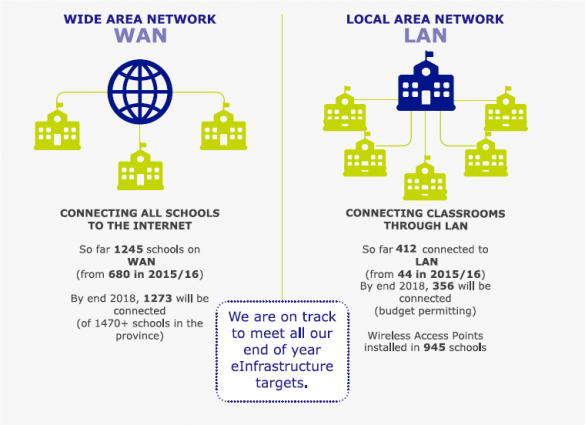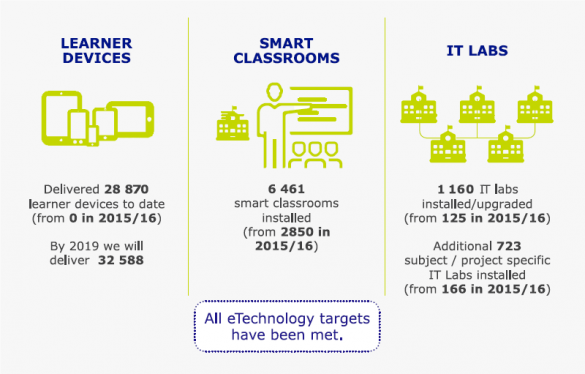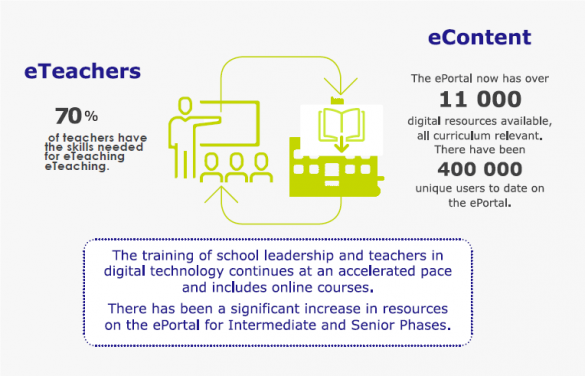Why is this important?
The South African education system faces many challenges, which has resulted in many learners leaving school inadequately prepared for a successful and productive life in the 21st Century.
Some of these challenges include:
- Major inequalities still exist between middle class schools and schools in townships and rural areas with insufficient resources and infrastructure at poorer schools;
- There have been a number of curriculum changes in the past, causing uncertainty in the system;
- Many educators across the country do not have the basic pedagogic and content knowledge competencies required to provide quality teaching.
The result: high drop-out rates and poor learner outcomes across the country, with many young people leaving school without having the ability to read, write or calculate at acceptable levels.The Western Cape Education Department has focused on tackling these challenges and has seen improvement in learner outcomes and retention rates in the province.
The Western Cape Education Department has focused on tackling these challenges and has seen improvement in learner outcomes and retention rates in the province. However there is still a major disparity in results between the poorer schools and the relatively more resourced schools. Another significant challenge relevant to the Western Cape is the fact that registration figures in our schools increase by almost twenty thousand learners every year.
Another significant challenge relevant to the Western Cape is the fact that registration figures in our schools increase by almost twenty thousand learners every year. These increasing numbers are putting further strain on the system that is largely reliant on traditional teaching and learning methodologies.
We see the eLearning Game Changer, which uses technology to enhance education, as a critical way to assist teachers and minimise the effects of increasing learner: teacher ratios in the province.
Most importantly, the eLearning Game Changer has the potential to equalise the quality of education between better resourced and poorer schools by supporting teacher development and allowing learners to access the best educational material and resources. They will also simultaneously develop their computer literacy, which is a vital skill when entering higher education or the workforce after they leave school.
How are we succeeding?
Infrastructure at schools

WAN: The number of eLearning Game Changer schools that have been migrated to WCG Broadband connectivity.
LAN: The number of eLearning Game Changer schools that have an operational Western Cape Education Department LAN.
Wireless Access Points: The number of schools that have received access points
Technology in classrooms

Learner devices: The number of devices that have been distributed to the eLearning Game Changer model schools
Smart classrooms: The number of Smart Classrooms deployed at eLearning Game Changer schools
IT Labs installed/ upgraded: Number of ICT Slim Labs rolled out by Western Cape Education Department
Training of teachers & provision of digital teaching and learning materials

Project Specific IT Labs: Number of Project specific Labs rolled out by Western Cape Education Department
What are we doing?
This Game Changer focuses on six streams namely, the creation of e-culture in schools, backed by e-infrastructure, and e-admin systems to run the schools, and well trained e-teachers using e-technology and e-content in their lessons.
- e-Infrastructure and e-Technology: Providing schools in the Western Cape with access to:
- Reliable, well managed connectivity, related infrastructure and support systems; and
- Teacher and learner technology
- e-Content: Providing up to date digital content that is responsive to the needs of teachers and learners.
- e-Teachers: Equipping principals, teachers, school management, support, and curriculum support teams to use technology effectively and innovatively.
- e-Culture: Creating an enabling environment for the roll out of eLearning through strong leadership and shared eLearning culture; and
- e-Admin: Reducing teachers and principals’ manual administration towards more effective planning and management

